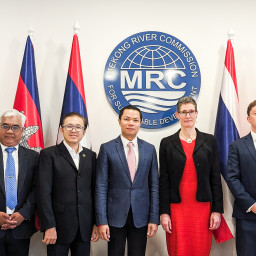Conference calls for innovative solutions for water, energy and food sectors
Political will needed for a ‘new, balanced nexus paradigm’ on natural resources management
PHUKET, Thailand, 3 May 2012—Decision-makers in the water, food and energy sectors must engage in dialogue across sectors and across boundaries to seek innovative solutions, the International Conference on Transboundary River Basin Management concluded at the closing of the three-day event Thursday.
Around 350 river managers, leaders and other stakeholders from around the world talked about ways to address the pressures caused by population growth, climate change and rapid urbanization on the water, food and energy nexus during a three-day conference called Mekong2Rio held on this southern Thai resort island.
The event, which was convened by the Mekong River Commission (MRC) and hosted by the Royal Thai Government, is a contribution on the road to Rio+20, the UN Conference on Sustainable Development.
The conference addressed the nexus of water, food and energy in transboundary context addressed these strategic issues and concluded that riparian countries should adopt policy and decision making processes that address this nexus at the national level and then transfer this thinking to the regional level.
“Having such a wide variety of key players from around the world with different perspectives helped solidify our message that we all need to work together on all different levels to achieve our goals,” said MRC Chief Executive Officer Hans Guttman.
One of the messages of the conference was that in transboundary settings there is a need to share data and information between countries not just on water but also on food and energy production.
It was stressed that in many countries economic development needs to be greener and moved towards a more balanced nexus approach in order to sustain ecosystems, functions and livelihoods
An improved science-policy dialogue is needed where the nexus thinking, being scientifically based should be at the center.
Participants heard that dams, which are being used more for food security issues as well as energy and economic development, still face some sustainability challenges.
The rural poor were singled out for their dependence on water-related food production such as rice and fish and were vulnerable to large infrastructure developments for large scale energy production and this should be addressed through study and stakeholder dialogue.
Joint policies between regional and national levels were also urged when dealing with climate change.
The MRC will bring the message to Rio+20 conference in June 2012 in Brazil but it is also hoped that the messages from the Mekong2Rio conference will also be promoted from the participants in the event.
For more information and conference programme please go to http://www.mrcmekong.org/news-and-events/events/mekong2rio/
Note to editors:
The MRC is the intergovernmental body responsible for cooperation on the sustainable management of the Mekong Basin whose members include Cambodia, Lao PDR, Thailand and Viet Nam. In dealing with this challenge, the commission looks across all sectors including sustaining fisheries, identifying opportunities for agriculture, maintaining freedom of navigation, flood management and preserving important ecosystems.
Mekong2Rio is the first in a series of the MRC biennial conferences on transboundary river basin management. It will be held at Movenpick Resort & Spa, Karon Beach, Phuket.
The United Nations Conference on Environment and Development held in Rio de Janeiro, Brazil in 1992 was an historic milestone ensuring development is balanced with environmental and social concerns. The United Nations Conference on Sustainable Development or Rio+20 aims at assessing what has been achieved since then and which gaps need to be filled and what political commitments will be required.
-END-





